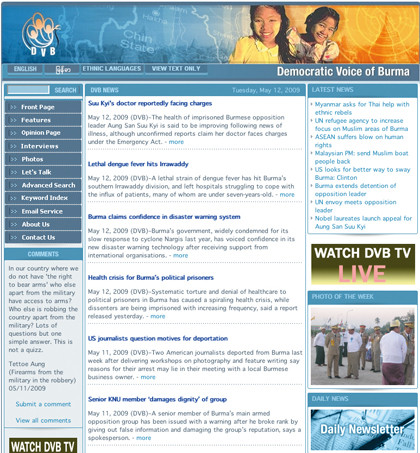Can Asia's fragile cyber-democracies survive?
Govts across SE Asia follow China's lead on censorship
Meanwhile, Vietnam's underground blogging movement has its government nervous. The number of internet users exploded from 20million to a massive 80million in 2008, prompting the Communist Party to follow the crackdown craze. In December, authorities announced they would seek help from Google and Yahoo to regulate the blogosphere.
Yahoo 360 is the blogging platform of choice in Vietnam and the company has agreed to operate under China's censorship rules. Some bloggers have been arrested, such as Nguyen Van Hai, who wrote under the pen name Dieu Cay and was hit with strange tax evasion charges after criticising China. Vietnam is wary of angering its powerful neighbour, a major trading partner.
With militant bloggers gathering in Ho Chi Minh City, known for its free Wi-Fi in cafes, the Communist Party feels under threat. Bloggers operate secretly, silently, meeting in chatrooms in smoky coffee shops as they direct protest movements. Unlike other countries in Asia, these nationalistic bloggers and hackers advocate going as far as to overthrow the government.
This underground cyber-movement began in December 2007 amid protests against China's claim to the Spratley and Paracel Islands. Student protestors needed a place to plan and promote free of government eyes. The internet proved popular, with bloggers sitting nonchalantly in fast-food restaurants, coordinating protests and instantly publishing photographs of police brutality.
Out of those photographs, Vietnam's notorious anti-government blog Vang Anh was born.
Cold war
"The Communists control us all. They'll block any website talking about politics," says 'Mr Cold', a dissident student blogger who never gives his real name. "Information in newspapers, on TV, on the radio, is censored and sometimes invented by the Communist Party. They decide what we hear, what we read, what we see."
Sign up for breaking news, reviews, opinion, top tech deals, and more.
'Mr Cold' advocates an immediate end to the central party. Government reprisals began last summer after bloggers coordinated protests against the Chinese embassy in Hanoi and hacked a government news website, Dan Tri. For hours the site read, "Our citizens! Let's demand pluralism!" and "Communists gag the press!"
Other sites have been hit by denial of service attacks by hackers, making them inaccessible. 'Mr Cold' thinks this was the start of an insurgency, and bloggers are gearing up to face the government. "They're facing more and more problems: the H5N1 virus [avian flu], economic degeneration … It looks like this year will come with a lot of explosions," he says.
Malaysia, once nominally democratic, is also stepping up cyber-censorship, with government agencies – including the prime minister's office – keeping tabs on popular blogs and websites. Raja Petra Kamarudin, an opposition party figure who founded the popular Malaysia Today website, was detained in 2008 under charges of threatening social stability. After being temporarily released, he's reportedly under pressure to flee the country. The government has since blocked Malaysia Today's original web address, which is constantly being changed to avoid censorship.

BURMA: The Democratic Voice Of Burma traced attacks on antigovernment websites to China and Russia, highlighting the far-reaching nature of Asia's internet crackdown
Meanwhile the Burmese junta, having blocked most websites, has sent officials to China for IT training. It appears the government or a pro-government group launched denial of service attacks against exile websites last September, coinciding with the anniversary of the 2007 Saffron Revolution, a monk-led uprising against the military. The attacks were traced to China and Russia, raising suspicions about Beijing's IT training.
In December, Cambodia lost its status as the region's last free internet stronghold, after the government ordered a website featuring paintings of nude traditional dancers blocked. In February, laws targeting porn seemed to have spread to subversive materials, after a report by Global Witness on mining and oil corruption was mysteriously inaccessible.

ERROR 404: The censorship of the internet in Burma did not take long to spread to 'subversive' materials
Techies blamed AngkorNet, a government-linked internet service provider, for censoring the site. To date, AngkorNet has denied blocking the report, which implicated officials in hiding millions in kickbacks for oil and mining concessions. But it remains inaccessible.
Yet there is hope. In October, a conglomerate of activist organisations, investors and internet companies – including Google, Yahoo and Microsoft – agreed guidelines to protect freedom of speech against repressive government. The Global Online Freedom Act is also making its way through the US House of Representatives, promising to punish US companies that collude with governments to silence free speech.
But with internet censorship in full force in Asia, legislation may not be enough. The economic crisis is sending the region into instability, and the internet – once the last bastion of freedom – may be the final domino.